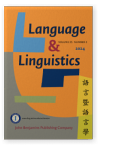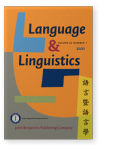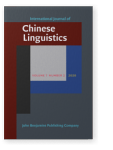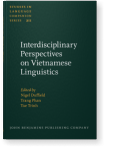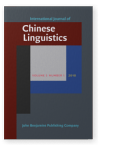Cheng-Yu Edwin Tsai
List of John Benjamins publications for which Cheng-Yu Edwin Tsai plays a role.
2024 The sole relative marker Language and Linguistics 25:2, pp. 318–350 | Article
The exclusive expression weiyi ‘sole/only’ in Mandarin can appear preverbally in a relative clause (e.g., wo weiyi xihuan de shu ‘the sole book I like’) but not in other types of clauses (e.g., *Wo weiyi xihuan shu, intended: ‘I only like books’). This paper first justifies the claim that weiyi… read more
2021 Exhaustivity and bare numeral phrases in Mandarin Language and Linguistics 22:1, pp. 111–166 | Article
A well-known generalization about bare numeral phrases (BNPs) in Mandarin is that they tend to require the existential verb you ‘have’ when in subject position, but there are some notable exceptions. This paper concentrates on the data cited by Li (1998) and proposes an Exhaustivity Condition… read more
2020 The syntax of Mandarin dative alternation: An argument from quantifier scope interpretation International Journal of Chinese Linguistics 7:2, pp. 187–222 | Article
This paper investigates the syntax of dative constructions (DCs) in Mandarin from the perspective of quantifier scope interpretation. In the literature, doubly quantified DCs such as Xiaoming ji-le yi-zhang mingxinpian gei mei-yi-wei laoshi ‘Xiaoming mailed one postcard to every teacher’ have… read more
2019 Chapter 9. Scalar implicatures and the semantics of wh-indefinites in Vietnamese Interdisciplinary Perspectives on Vietnamese Linguistics, Duffield, Nigel, Trang Phan and Tue Trinh (eds.), pp. 181–212 | Chapter
In this chapter we attempt to account for the meaning of wh-indefinites in Vietnamese through a formal system of scalar implicatures and exhaustification (Chierchia, Fox & Spector 2012; Chierchia 2013). While Vietnamese wh-indefinites occur in a variety of licensing contexts, we conclude that the… read more
2018 The syntax and semantics of descriptive V- de constructions: A primary predication analysis International Journal of Chinese Linguistics 5:1, pp. 59–93 | Article
This paper tackles the long-standing problem of the phrase structure of the descriptive V-de construction in Mandarin, and proposes a variant of the Primary Predication analysis. I argue that the suffix -de is a nominalizing head that turns the verb to which it attaches into a nominal event… read more
